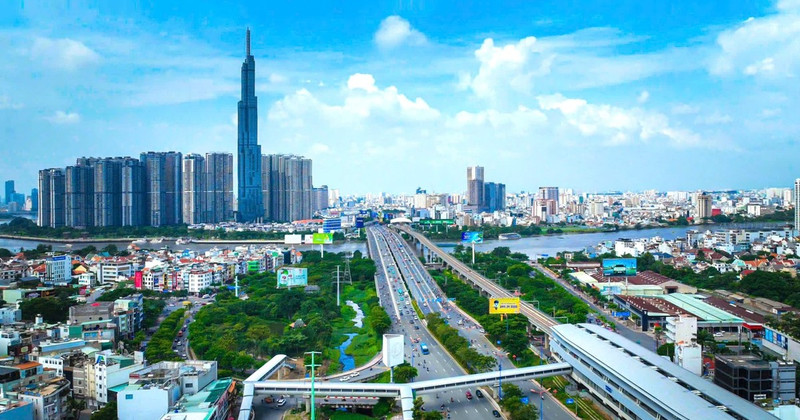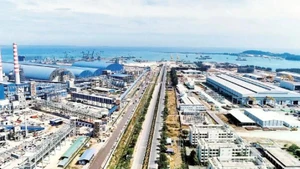Solid foundation for development
As Vietnam’s leading economic centre, Ho Chi Minh City contributes over 22% of the national GDP, accounts for 30% of total state budget revenue, and handles approximately 50% of the country’s financial transactions.
Strategically located along vital trade routes in Southeast Asia, Ho Chi Minh City has become an attractive destination for global capital flow. In terms of its growth pace, the city is well on its way to becoming an IFC, bolstered by strong government support and proactive efforts by local authorities to advance policy reform, develop financial infrastructure, and attract fintech investment.
The explosive growth of fintech firms such as MoMo, VNPay, and ZaloPay has not only promoted financial inclusion but also significantly boosted Ho Chi Minh City’s financial ecosystem, helping the city evolve into a true digital financial hub.
According to the 2023 Vietnam Fintech Report, the number of e-wallet and digital financial service users has exceeded 70 million accounts. Cashless payments now account for more than 50% of total transaction value in major cities. Fintech companies are no longer limited to payment solutions as they are expanding into consumer credit and peer-to-peer (P2P) lending platforms, helping millions of people access credit more easily.
Insurtech is also gaining ground, with numerous platforms offering user-friendly digital solutions to improve insurance penetration in Vietnam.
Investment platforms for stocks and digital assets are digitising the investment and asset management process.
Vietnam’s blockchain ecosystem is developing rapidly, with notable projects such as Kyber Network and TomoChain as well as companies offering blockchain-based financial solutions.
A major driving force behind Ho Chi Minh City’s ambition to become an IFC is the promotion of capital markets and public funding (Initial Public Offering-IPO) for fintech companies.
The Ho Chi Minh Stock Exchange (HOSE) and the UPCoM trading platform could serve as launchpads for domestic fintech firms. With targeted policy support, Ho Chi Minh City could potentially become Southeast Asia’s IPO hub for fintech. For example, Singapore’s SGX exchange has positioned the city-state as a regional IPO magnet. Southeast Asian tech startups including Sea Group (Shopee) and Grab have been successfully listed on exchanges in Singapore and the US, raising billions of US dollars in investment.
Overcoming Challenges
Despite its strong potential, Ho Chi Minh City still faces several challenges on its path to becoming an international financial centre.
Firstly, the legal framework remains underdeveloped. One of the biggest obstacles for fintech in Vietnam is the lack of a comprehensive regulatory framework. While the government is piloting a regulatory sandbox for fintech, specific policies on digital assets, blockchain, digital banking, and data protection are still lacking.
Secondly, the financial ecosystem is not yet robust. To qualify as an IFC, Ho Chi Minh City needs a comprehensive financial ecosystem, including the presence of major global investment banks like Goldman Sachs and Morgan Stanley; investment and hedge funds to boost market liquidity; and digital asset exchanges to facilitate trading of Bitcoin and blockchain-based assets.
Many domestic and international financial experts agree that Ho Chi Minh City should look to Singapore’s policy model and work toward building a broader digital financial ecosystem. The Singaporean government has adopted breakthrough policies, including tax exemptions and investment incentives for fintech companies; legal recognition of Bitcoin and digital assets; licensing for major cryptocurrency exchanges; and significant investment in tech infrastructure and education to attract global fintech talent.
In reality, Ho Chi Minh City is facing a historic opportunity to become Southeast Asia’s next international financial centre. Moreover, by fully leveraging its existing advantages, the city could compete with financial hubs like Singapore, Hong Kong (China), and Dubai (UAE) in attracting global capital.
However, to seize this opportunity, Ho Chi Minh City must quickly finalise a broad and enabling legal framework, develop a strategic talent acquisition plan, and build a robust financial ecosystem.
Currently, most of Vietnam’s fintech startups still rely heavily on venture capital (VC) funding from firms like Sequoia Capital, SoftBank, and GIC. To expand further and achieve stronger growth, IPOs will be a key strategic direction.
















